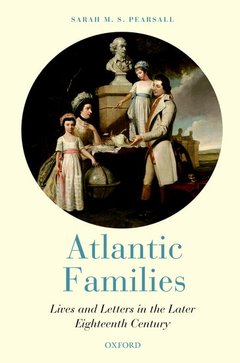Description
Atlantic Families
Lives and Letters in the Later Eighteenth Century
Author: Pearsall Sarah M. S.
Language: English
Approximative price 67.55 €
In Print (Delivery period: 21 days).
Add to cart
Atlantic families: lives and letters in the later eighteenth century (paperback)
Publication date: 11-2010
320 p. · 15.5x23.4 cm · Hardback
Publication date: 11-2010
320 p. · 15.5x23.4 cm · Hardback
Atlantic families: lives and letters in the later eighteenth century (harback)
Publication date: 11-2008
310 p. · 16.1x24.1 cm · Hardback
Publication date: 11-2008
310 p. · 16.1x24.1 cm · Hardback
Description
/li>Contents
/li>Biography
/li>Comment
/li>
The Atlantic represented a world of opportunity in the eighteenth century, but it represented division also, separating families across its coasts. Whether due to economic shifts, changing political landscapes, imperial ambitions, or even simply personal tragedy, many families found themselves fractured and disoriented by the growth and later fissure of a larger Atlantic world. Such dislocation posed considerable challenges to all individuals who viewed orderly family relations as both a general and a personal ideal. The more fortunate individuals who thus found themselves divided by the Atlantic were able to use family letters, with attendant emphases on familiarity, sensibility, and credit, in order to remain connected in times and places of considerable disconnection. Portraying the family as a unified, affectionate, and happy entity in such letters provided a means of surmounting concerns about societies fractured by physical distance, global wars, and increasing social stratification. It could also provide social and economic leverage to individual men and women in certain circumstances. Sarah Pearsall explores the lives and letters of these families, revealing the sometimes shocking stories of those divided by sea. Ranging across the Anglophone Atlantic, including mainland American colonies and states, Britain, and the British Caribbean, Pearsall argues that it was this expanding Atlantic world-much more than the American Revolution-that reshaped contemporary ideals about families, as much as families themselves reshaped the transatlantic world.
Prologue. Introduction. Part I: "Dealing by Ink Altogether": Mechanisms of Connection and Disconnection. Introduction to Part I. 1. Fractured Families: The Perils and Possibilities of Atlantic Distance. 2. Familiarity in Life and Letters. 3. Sensibility in Life and Letters. 4. Credit in Life and Letters. Part II: "What may be our Lot": Stories of Connection and Disconnection. Introduction to Part II. 5. The Repentant Son and the Unforgiving Father: Making a Man of Feeling, a Man of Credit. 6. The Farewell between Husband and Wife: The Politics of Family Feeling. 7. The Old Husband and the Young Wife: Scandal, Feeling, and Distance. Conclusion. Epilogue. Bibliography.
Sarah M. S. Pearsall is a member of the Department of History, Oxford Brookes University. She was previously a Lecturer in Modern History at St. Andrews University, and has held long-term fellowships at the Newberry Library and Cambridge University. She received her PhD from Harvard University. Her articles have appeared in numerous books and journals, including The William and Mary Quarterly.
Valuable...[the book] demonstrates the historical and intellectual value of attending to the individual and contingent, revealed through the material traces of personal correspondence and the surprising capacity of letters to undercut stereotypes, to reinflect grand historical narratives of national or economic progress, 'and to reveal something new' about the Atlantic worlds of the eighteenth century.
© 2024 LAVOISIER S.A.S.




